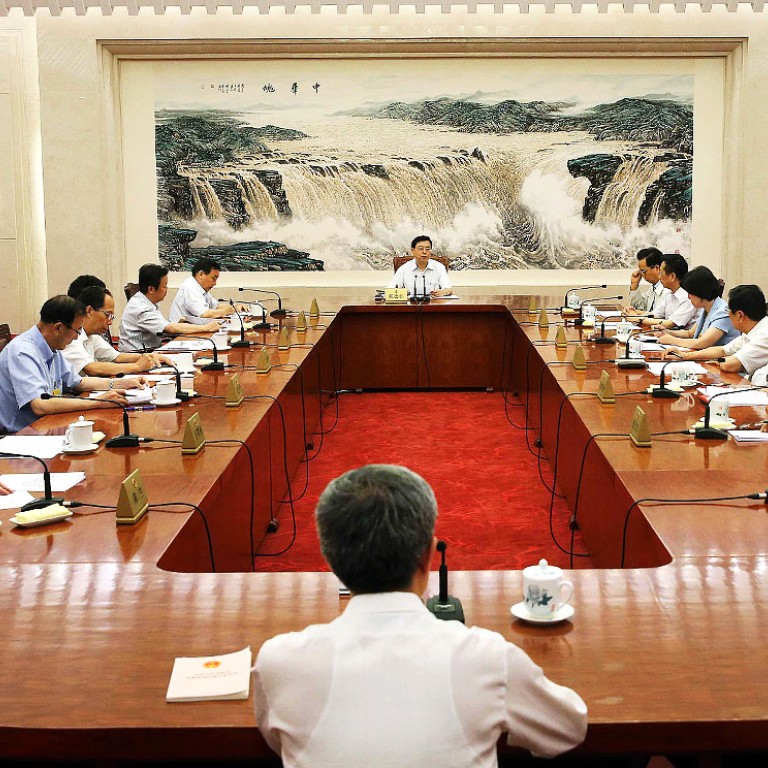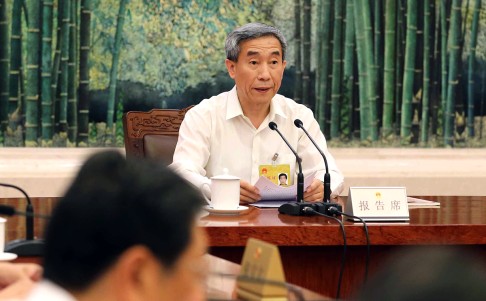
Pan-democrats vow to fight 'more stringent than expected' NPC 2017 poll plan
Central government has moved a step closer to a showdown with pan-democrats after the nation's top legislative body hammered out a tougher-than-expected framework for the 2017 chief executive election.
The central government moved a step closer to a showdown with pan-democrats yesterday after the nation's top legislative body hammered out a tougher-than-expected framework for electing Hong Kong's chief executive by universal suffrage in 2017.
Under an initial decision by the National People's Congress Standing Committee, only two or three candidates would be allowed to stand for the election and they would need 50 per cent support from a 1,200-member nominating committee, two sources said.
Beijing has taken the Hong Kong government’s role to decide the reform proposal
Pan-democrats found the framework unacceptable and vowed to veto the Hong Kong government's reform proposal if it contained the same restrictions when it comes before the Legislative Council.
Some also pledged to join the Occupy Central movement, which plans to mobilise 10,000 people to block roads in the city's financial district if if there is not a "genuine" choice of candidates. The government needs the votes of at least five pan-democrat lawmakers to secure the required two-thirds majority in Legco for its reforms to launch the first "one person, one vote" election for the city's leader.
But the Democratic Party and information-technology sector lawmaker Charles Mok, seen as the main targets of the government's lobbying, said they could not see any room for further negotiation.
"I don't know what else can be discussed in the second round of consultation. Beijing has taken the Hong Kong government's role to decide the reform proposal," Mok said.
A third source familiar with the Standing Committee's decision said it did not mention amending the electoral method after 2017 - a possibility held out earlier by the Hong Kong and central governments to woo moderate pan-democrats to accept an "imperfect" model.
The stringency of the draft decision, especially the rule that the nominating committee should consist of 1,200 members - the same as the election committee that chose Leung Chun-ying in 2012 - appeared to have gone further than local NPC deputies' original expectations.
They had thought that the Standing Committee would set a 50 per cent nominating threshold and a cap on the number of candidates. Many proposals in the first round of consultation envisioned an expansion of the nominating committee.

The draft will be discussed in groups this morning before a final plenary session on Sunday to vote on the document.
NPC deputy Ip Kwok-him said he felt the draft "provided clear responses on core issues" - in reference to the debate on nomination.
The draft decision said the nominating committee should consist of people from four sectors - the business, professional, social and political sectors - with 300 members each.
But the first two sources confirmed that it did not mention some finer details, such as whether the mandate of the nominating committee should be expanded or whether the committee members could have more than one vote. It was understood that those issues would be further discussed in Hong Kong.
Speaking in Hong Kong, former Basic Law Committee member Wang Zhenmin called on Hong Kong people to accept the proposal, as "an imperfect universal suffrage [plan] can be improved in future".
Pan-democratic groups - including the Occupy campaigners, the Alliance for True Democracy and the Federation of Students - held a meeting last night to discuss the NPC draft.
Occupy co-organiser Benny Tai Yiu-ting said a demonstration would be held on Sunday outside the chief executive's office at Tamar. He said it would not be a "rehearsal" for the Occupy movement, but he would announce the campaign's next move then.
Democratic Party chairwoman Emily Lau Wai-hing said: "The Democratic Party must veto the reform if it turns out to be the proposal tabled in Legco."
KEY POINTS
- Chief executive candidates will be named by a 1,200-strong nominating committee made up of representatives from four sectors
- Number of candidates fixed at two or three
- Aspirants will be required to secure support from at least half the nominating committee
- The winner must clinch more than half the valid votes

